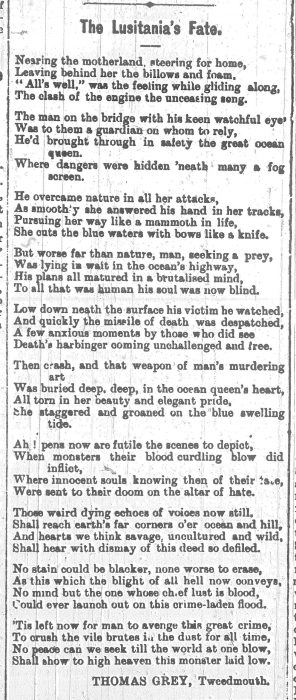The Lusitania’s Fate – Poem by Thomas Grey, 1915
Reference: Berwick Advertiser, 14 May 1915
Suggested age groups: KS3, KS4, Lifelong Learners
Subject areas: History, Literacy, Art
CONTEXT
Thomas Grey was born in Shoreswood, near Berwick in 1863. He worked for North Eastern Railways as a train driver for many years. In his 40s he was forced to find other work due to ill health. In 1918 he started working for the Post Office, but left that job, too, because of illness.
Thomas seems to have written poetry all of his adult life. In 1906 he published a book of poems called Musings on the Footplate (the footplate is part of a steam engine that the driver stands on while driving the train.) It was the only book that he published during his lifetime, but the Berwick Advertiser regularly published his poems in the newspaper.
During the First World War Thomas was too old to fight, but three of his sons served in the armed forces. He often wrote about events during the war. After the war, he was part of the committee that put up the war memorial in Tweedmouth.
More about his life and poetry can be found by following the link below.
The Lusitania was a ship carrying civilian passengers that was sunk by a German submarine on 7 May 1915. 1,193 people died and there was an international outcry. The sinking of the Lusitania is often credited as one of the reasons for America joining the war, although they did not do so until April 1917.
In England, the outraged caused by the sinking was used to encourage recruitment. It also sparked a series of riots across the country in which German businesses, particularly butchers’ shops, were targeted. In the North East mobs violently attacked German butchers’ premises in South Shields, Sunderland, Blyth and Berwick on 15 May 1915.
SANT/GEN/MIL/3/1/28 – Printed recruitment poster showing slogans regarding the sinking of the Lusitania, 1915.
ACTIVITIES
ACTIVITY 1
Background
Thomas Grey was born in Shoreswood, near Berwick in 1863. Thomas seems to have written poetry all of his adult life. During the First World War Thomas was too old to fight, but three of his sons served in the armed forces. He often wrote about events during the war.
SEE
See: Where is Thomas Grey from?
See: How long did Thomas write poetry for?
See: What did Thomas often write poetry about?
See: Why didn’t Thomas serve during WW1?
See: Where was this poem published?
THINK
Think: Whose point of view are the poems told from?
Think: What influenced the poet to write this poem?
Think: What narrative is being told through the poem?
Think: What linguistic features are used to convey meaning in the poem?
Think: What is the form and structure of the poem?
Think: What is the purpose of the poem?
Think: How does the poem effect the reader?
DO
Do: Create a poster illustrating the narrative of the poem. Select key phrases or lines from the poem to include on the poster.
Do: Choose three words from the poem that sum it up. Use these three words to form the basis of your own poem.
Do: Write an alternative title for the poem. Does this change the meaning of the poem?
Do: Identify all of the nouns, verbs, adverbs and adjectives in the poem. Make a word cloud. Is there any sort of pattern? Try changing some of those words – what affect does it have on the mood of the poem?
Do: In a small group learn the words to the poem to perform to the rest of the class. Think about who says which line/word. Can you create emphasis by saying certain words together as a group? Will you say, whisper, shout or sing some words/lines?
Do: Close your eyes and listen to the poem being read out. Create an abstract continuous line drawing while listening to the poem responding to what you hear. Explain why you have drawn it that way.
Do: Write out the poem using the pattern of your abstract line drawing. Add colour and illustrations where necessary. Explain why you have chosen to present the poem this way.
Resources
ACTIVITY 2
Background
The Lusitania was a ship carrying civilian passengers that was sunk by a German submarine on 7 May 1915. 1,193 people died and there was an international outcry. The sinking of the Lusitania is often credited as one of the reasons for America joining the war, although they did not do so until April 1917.
In England, the outraged caused by the sinking was used to encourage recruitment. It also sparked a series of riots across the country in which German businesses, particularly butchers’ shops, were targeted. In the North East mobs violently attacked German butchers’ premises in South Shields, Sunderland, Blyth and Berwick on 15 May 1915.
SEE
See: What was the Lusitania?
See: What happened to the Lusitania?
See: What effect did the sinking of the Lusitania have on Britain?
See: What happened to German butchers’ premises in the North East?
THINK
Think: Why did a German submarine sink a civilian passenger ship?
Think: Why is the sinking of the Lusitania credited as one of the reasons America joined the war?
Think: Why did the sinking of the Lusitania spark riots?
DO
Do: Create a poster to show the ways that German submarine warfare impacted civilians.
Do: Research the sinking of the Lusitania. In groups debate whether it was right for German submarines to attack civilian and merchant vessels. Think about what the Geneva Convention said about the rules of international warfare at the time.
Do: Write a poem about the sinking of the Lusitania and its impact on the war.
Do: Write a poem from the perspective of one of the North East German butchers.
Do: Write a newspaper article about the North East mobs attacking German butchers’ premises.
Do: Research how Germans and Austrians living in Britain during WW1 were treated. In groups discuss whether or not it was fair for them to be treated this way.
Resources
OTHER ONLINE RESOURCES
Lusitania
Lusitania website, includes list of casualties and other resources:
Short summary of Lusitania attack and aftermath, Imperial War Museum:
https://www.iwm.org.uk/history/18-minutes-that-shocked-the-world
Imperial War Museum website, podcast about Submarine warfare, including sinking of Lusitania, includes oral history interviews:
https://www.iwm.org.uk/history/voices-of-the-first-world-war-the-submarine-war
Germans Living in the North East
Northumberland Archives blogs about “enemy aliens”:
https://northumberlandarchives.com/2016/01/13/aliens-at-woodhorn/
https://northumberlandarchives.com/2019/05/23/enemy-aliens/
https://northumberlandarchives.com/2019/07/17/north-east-aliens-friend-or-foe/
Thomas Grey
Friends of Berwick and District Museum and Archives website, page about Thomas Grey: http://www.berwickfriends.org.uk/history/thomas-grey-poet/


